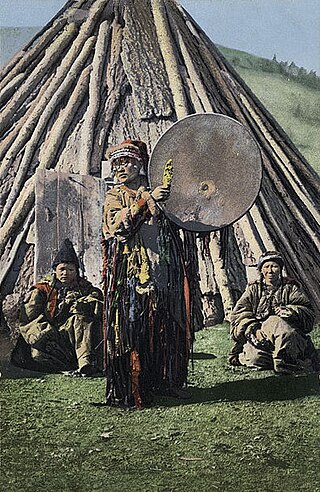Loading AI tools
中亞游牧民族的傳統信仰 来自维基百科,自由的百科全书
騰格里信仰是突厥人、蒙古人、匈人和匈奴等中亞游牧民族的傳統信仰[1],帶有薩滿教、泛靈信仰、圖騰崇拜和祖先崇拜色彩。騰格里信仰以一神論思想為主[2][3],崇拜中心神靈騰格里(突厥語:𐱅𐰭𐰼𐰃 ẗŋr̈y→täŋri、täŋäri或täŋiri;保加利亞語:Тангра Tangra;土耳其語:Tanrı;蒙古語:ᠲᠩᠷᠢ Tngri;達斡爾語:tangar /təŋgər/[4];哈薩克語:تاڭىر Тәңір 回鶻語:![]() /tängri/;維吾爾語:تەڭرى tengri[5])。後由於受到佛教、印度教等影響,騰格里被加上各種稱呼,分裂成為眾多神靈,17世紀後甚至出現「九十九騰格里」的說法,有學者因而稱之為「一神論和多神論的結合」[6]。在歐洲,可薩人、保加爾人、馬扎爾人[7]和阿瓦爾人也曾信仰騰格里[8]。騰格里信仰也是歷史上突厥汗國、西突厥汗國、舊大保加利亞和保加利亞第一帝國的主要宗教。
/tängri/;維吾爾語:تەڭرى tengri[5])。後由於受到佛教、印度教等影響,騰格里被加上各種稱呼,分裂成為眾多神靈,17世紀後甚至出現「九十九騰格里」的說法,有學者因而稱之為「一神論和多神論的結合」[6]。在歐洲,可薩人、保加爾人、馬扎爾人[7]和阿瓦爾人也曾信仰騰格里[8]。騰格里信仰也是歷史上突厥汗國、西突厥汗國、舊大保加利亞和保加利亞第一帝國的主要宗教。

「騰格里」一詞最早出於匈奴,在中國古代典籍中,寫作「撐犁」[9][10]。「騰格里」,是古代中亞游牧民族對於天的稱呼,與突厥同族的敕勒發展出了「蒼天」(Koke Tengri;蒙古語:Khukh Tengri)的概念[11],而蒙古人將蒙哥·騰格里(突厥語:Mangu Tangri;蒙古語:Mongke Tangri,漢語譯作長生天)作為最高信仰。現代土耳其語也稱騰格里信仰為「Göktanrı dini」,意為「天神教」,語源是蒙古語的「Khukh Tengri」,即「蒼天」[12]。
騰格里信仰認為人的存在由「長生天」騰格里和大地母親Umay維持,人需要誠實、有敬畏心地生活以調和自己的世界,並使自身的靈魂變得更為完美[1]。
騰格里信仰在其各信眾部族中逐漸被伊斯蘭教、藏傳佛教、摩尼教[13]和基督教等強勢宗教取代,但自20世紀90年代起蘇聯解體起,中亞新建立的突厥語族共和國又開始重新推崇這種傳統信仰[14][15],在俄羅斯西伯利亞的薩哈共和國、韃靼斯坦共和國、布里亞特共和國和圖瓦共和國等地也有復甦跡象,但不與既有信仰衝突[16]。吉爾吉斯共和國的前政府成員達斯坦·薩里古洛夫成立了「騰格里軍」(Tengir Ordo),旨在宣傳騰格里信仰的傳統價值;他還領導有一個聲稱有50萬名信眾的騰格里社群,支持國際騰格里信仰的研究[17]。
蒙古薩滿信仰(蒙古語:Бөө мөргөл Böö mörgöl)以騰格里信仰為核心,也常常被直接稱為「騰格里信仰」或「騰格里教」(Tengrism)[18][19]。
Seamless Wikipedia browsing. On steroids.
Every time you click a link to Wikipedia, Wiktionary or Wikiquote in your browser's search results, it will show the modern Wikiwand interface.
Wikiwand extension is a five stars, simple, with minimum permission required to keep your browsing private, safe and transparent.